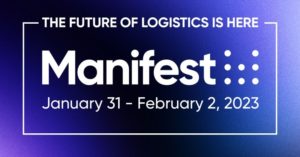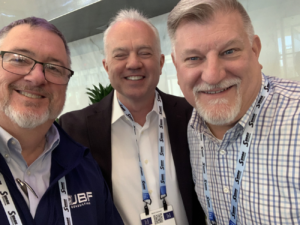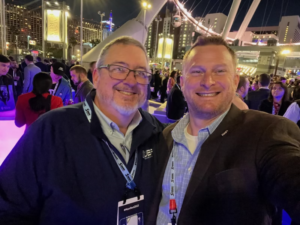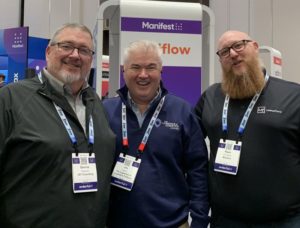
Earlier this month our team attended the Manifest 2023 Logistics Conference in Vegas. This show brings together the most comprehensive ecosystem of innovation and transformation in supply chain and logistics. It was fantastic to see thousands of industry leaders come together to discuss supply chain excellence.

Dennis Heppner, Kyle Stone, and Tony Wayda of JBF Consulting
Over the course of the 3-day event, we had many conversations with colleagues and attended workshops. Here's a break down of our key insights and themes from the conference:
1. Sustainability
We all know this is a hot topic, but all good logisticians should be contributing to the cause daily by optimizing their supply chain - reducing miles, trucks, and optimizing loads.
Some of the larger companies are starting to leverage EV’s inside the 4 walls, yard and even on short hauls but the price point is still out of reach for a lot of companies.
As the Executive Director from the Port of LA stated, the majority of the dray drivers are 1st or 2nd generation Americans with small fleets (5-10 trucks) that they acquired on the secondary market for ~50K.
Investing $200K to $350K (depending on which truck brand on model you select) is out of reach for most smaller trucking firms. Government incentives may help but will need to do a lot more to see any real market adoption.
Investing $200K to $350K [in EVs] is out of reach for most smaller trucking firms.

Dennis Heppner and Terry Reinert of Fleet Defender
2. Visibility Data
The same discussion has been occurring for 20 years. Siloed data with the large providers - Project44, FourKites, Transporeon, Infor/GT Nexus, Descartes, etc.
There will always be multiple visibility platforms due to competitive and geopolitical reasons. Interoperability between the platforms was discussed as a next step, but this area of logistics has only made baby steps in the last several years.
These platforms should be used by shippers as a source of data and the shippers themselves should own the data.
3. Tech Funding
Manifest was very focused on emerging tech (EV tech & some Robotics) and smaller niche player with lots of VC and equity firms being very vocal about having money available.
While there still seems to be a lot of seed money available the amounts are not the crazy dollars that were thrown at tech startups in the last two years. We believe the pendulum has swung back to the days when more due diligence of a technology occurs and first round funding was truly a seed, not a bankroll.

Dennis Heppner, Joe Lynch of Logistics of Logistics podcast, and Ryan Schreiber of Metafora
The pendulum has swung back to the days when more due diligence of a technology occurs and first round funding was truly a seed, not a bankroll.
Pros
- Increased Competition - Shippers, Carriers and Brokers have more options than ever.
- Increased Innovation – Lots of brain power looking at our industry in new ways facilitates non-incremental improvements.
- Elegant Application Architecture - The new technology is built for the cloud and mobile. The UX is critical.
- Low Cost - Silicon Valley is subsidizing vendor losses as log-tech companies prioritize market share over profitability.
- Filling the Gaps – Strategic acquisitions that address holes in a log-tech company portfolio can create the elusive “1 + 1 = 3” scenario.
Cons
- “Fake it Until You Make It” mindset – Tech companies have long lived by this credo (e.g. Nikola, Theranos).
- Re-platforming – Forced cloud migration for those companies that had originally acquired on-prem licenses.
- M&A Driven Application Sunsetting (e.g. BluJay, Blue Yonder E2open).
- Problem Oversimplification – Lack of domain expertise leads to incomplete systems.
- Arrogance – “We know better.”
- Use FOMO / BS Bingo to intimidate customers.
- Most of the start-ups will fail – Customers must choose wisely.